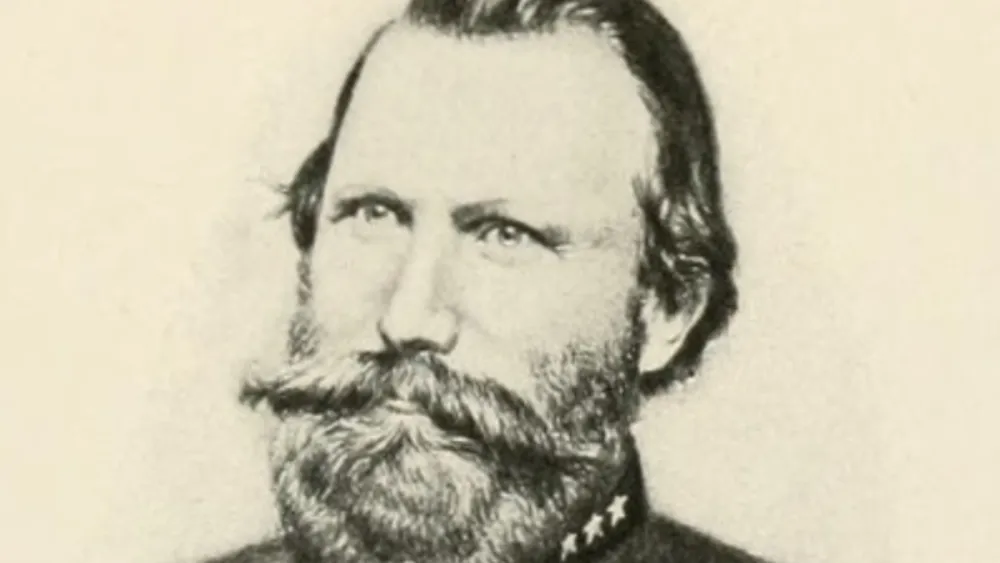James Ewell Brown Stuart, known as Jeb, carved a legendary path through the annals of American military history. Hailing from a distinguished lineage, he rose to prominence as a daring cavalry general in the Confederacy during the Civil War. Read on and explore this esteemed soldier’s remarkable life and enigmatic legacy.
Early Life and Military Training
James Ewell Brown Stuart, affectionately known as Jeb, was born into a family with a rich military heritage.
His great-grandfather, Major Alexander Stuart, served during the Revolutionary War, while his father, Archibald Stuart, fought in the War of 1812. These influences instilled in Jeb a strong sense of duty and honor from an early age.
After completing his early education, Jeb attended Emory and Henry College, where he began to nurture his intellectual and leadership skills.
However, his time at West Point shaped him into a disciplined and capable military officer. Graduating 13th out of 46 in 1854, he laid the foundation for his future achievements.
During his days at West Point, Jeb Stuart first encountered and forged a lasting friendship with another promising cadet, Robert E. Lee. This bond would prove pivotal in shaping both men’s destinies and the course of the Civil War.
Crossing the Divide: The Journey of Jeb Stuart to the Confederacy
Jeb Stuart faced a momentous decision when Virginia seceded from the Union in May 1861 after a distinguished career in the United States Army.
Opting to embrace his Southern roots, he joined the Confederacy despite his father-in-law’s choice to remain in the U.S. Army.
Assigned to Thomas “Stonewall” Jackson, Stuart’s rapid promotion to Colonel marked the beginning of his rise as a prominent Confederate cavalry officer. His loyalty and exceptional skills would play a significant role in the challenging years that followed.
Jeb Stuart Riding the Tides of War
Here’s a closer look at Stuart’s role in key battles:
First Battle of Bull Run
During the First Battle of Bull Run, Jeb Stuart played a pivotal role as a Confederate cavalry commander.
Moreover, Jeb Stuart’s cavalry fearlessly took on daring reconnaissance missions, furnishing General Joseph E. Johnston and General P.G.T. Beauregard with vital intelligence.
This timely information helped the Confederate forces anticipate and counter the Union Army’s movements.
Stuart’s relentless attacks on the Union flank disrupted their momentum, contributing significantly to their ultimate retreat back to Washington, DC.
Master of Reconnaissance
Jeb Stuart’s exceptional skill in reconnaissance was showcased during two crucial campaigns of the Civil War.
In the Peninsula Campaign, he conducted daring exploits behind enemy lines, gathering vital information about the Union Army’s positions and intentions.
His intelligence reports were instrumental in guiding General Robert E. Lee’s strategic decisions.
Similarly, at the Battle of Antietam, Stuart’s reconnaissance missions were critical in determining the disposition of Union forces, enabling Lee to execute a formidable defensive strategy.
Recognizing his immense contributions, Stuart was promoted to major general, cementing his status as one of the Confederacy’s most talented and trusted commanders.
Temporary Command of Jackson’s Second Corps
Following General Thomas “Stonewall” Jackson’s untimely death at the Battle of Chancellorsville, Jeb Stuart assumed temporary command of Jackson’s Second Corps.
Stuart stepped into a crucial leadership role as the Confederate Army prepared for the Gettysburg Campaign.
He skillfully exploited the success of Jackson’s influential flank attack during the Chancellorsville battle, maintaining the momentum of the Confederate forces.
Though his tenure as a temporary corps commander was brief, Stuart’s strategic insight and unwavering determination were crucial in supporting General Lee’s military objectives during this critical phase of the war.
Controversy During the Gettysburg Campaign
The Gettysburg Campaign marked a turning point in the perception of Jeb Stuart’s abilities as a cavalry commander. Before 1863, Stuart’s seemingly invincible cavaliers had often embarrassed the Federal mounted arm. However, as the war entered its third summer, this perception shifted.
One significant event that contributed to the controversy was the Battle of Brandy Station, where Union cavalry surprised Stuart’s forces with an unexpected attack.
This incident exposed a vulnerability in Stuart’s reconnaissance capabilities, as he failed to detect the movements of the Union cavalry in advance.
Stuart’s Strategic Detachment at Gettysburg
During the critical days leading up to the Battle of Gettysburg, Stuart’s cavalry was absent from General Lee’s army, having ventured on a risky raid around the Union forces.
This strategic detachment from Lee’s main force left the Confederate army without crucial intelligence and reconnaissance information, making them blind to the enemy’s position and intentions.
Stuart’s delayed arrival on the second day of the Battle of Gettysburg further intensified the controversy surrounding his actions.
Though he attempted to make amends with aggressive attacks on the Union forces, the delay had already hindered the Confederate army’s coordination and decision-making during the battle’s early stages.

Farewell to a Gallant Cavalier: The Death of Jeb Stuart
Jeb Stuart’s ultimate confrontation came on May 11, 1864, on the outskirts of Richmond. As the Confederate cavalry fought desperately to prevent General Philip Sheridan’s Federal horsemen from reaching the Confederate capital, the battlefield echoed with thundering hooves and fierce clashes.
Amidst the chaos, tragedy struck when a dismounted Michigan trooper fired a fatal shot at Stuart with his pistol. The mortal wound proved fatal, and Jeb Stuart succumbed to his injuries on May 12, 1864. His passing left a profound void in the Confederate ranks, and he was mourned by his comrades and adversaries.
Remembering a Legendary Leader
As a tribute to his contributions and bravery, he was buried at Hollywood Cemetery in Richmond, a final resting place befitting a gallant and respected soldier.
Jeb Stuart’s death marked the end of an era for the Confederate cavalry, losing one of their most celebrated and capable leaders. His legacy endured as a symbol of Southern bravery and daring, forever etched into the annals of American military history.
Though the war raged on, the memory of Stuart’s indomitable spirit and extraordinary leadership remained alive and inspiring.










